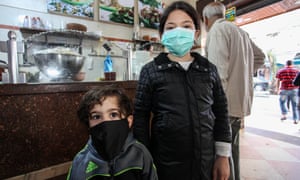More cases of rare syndrome in children reported globally
Nearly 100 cases of the unusual illness linked to Covid-19 have emerged in at least six countries
 Some doctors suspect the syndrome is a “post-infection inflammatory response” where the immune system overreacts in the wake of an infection. Photograph: APAImages/REX/Shutterstock
Some doctors suspect the syndrome is a “post-infection inflammatory response” where the immune system overreacts in the wake of an infection. Photograph: APAImages/REX/ShutterstockWed 29 Apr 2020 18.55 BST
Doctors around the world have reported more cases of a rare but potentially lethal inflammatory syndrome in children that appears to be linked to coronavirus infections.
Nearly 100 cases of the unusual illness have emerged in at least six countries, with doctors in Britain, the US, France, Italy, Spain and Switzerland now reported to be investigating the condition.
The first cases came to light this week when the NHS issued an alert to paediatricians about a number of children admitted to intensive care units with a mix of toxic shock and a condition known as Kawasaki disease, an inflammatory disorder that affects the blood vessel, heart and other organs. So far 19 children have been affected in the UK and none have died.
The French health minister, Olivier Veran, said on Wednesday that the country had more than a dozen children with inflammation around the heart, and while there was insufficient evidence to prove a link with coronavirus, he said the cases were being taken “very seriously.”
Veran told Franceinfo news radio he had received an alert from Paris concerning “about 15 children of all ages”, adding that other cases had been reported in Spain, Italy and Switzerland. He listed the symptoms as fever, digestive problems and vascular inflammation.
At least three children in the US aged six months to eight years are being treated for a similar condition. Mark Gorelik, a specialist treating the patients at Columbia University Medical Center in New York, said all had fever and inflammation of the heart and gut. “Right now, we’re at the very beginning of trying to understand what that represents,” he told Reuters.
Gorelik believes the cases are not Kawasaki disease but a similar condition that shares a common cause, namely an infectious agent that triggers an immune response.
The three New York cases follow a report from Stanford University in California, in which a 6-month-old was admitted to hospital with Kawasaki disease and was later diagnosed with coronavirus.
Many of the children having treatment for the new syndrome have tested positive for coronavirus, but others have not. That could mean that the syndrome is not related to coronavirus, that the children had cleared the virus before they were tested, or that the test missed the infection.
Some doctors suspect the syndrome is a “post-infection inflammatory response” where the immune system overreacts in the wake of an infection. This would suggest that in some children the disease has two phases – the initial infection and a secondary immune response that takes hold later.
Dr Nazima Pathan, a consultant in paediatric intensive care in Cambridge, said the number of children admitted to intensive care units with Covid-19 was relatively low, but that some were presenting with what looked like toxic shock syndrome and Kawasaki disease. “These children have had a severe and prolonged inflammatory response to Covid-19 infection and they have not had severe lung disease, unlike the majority of cases in adults,” she said.
“Whilst this is an evolving situation, it is clear that these symptoms are reported in only handfuls of cases,” Pathan added. “The important message is that if parents are worried about their children’s health, they should seek medical advice.”
The new syndrome, which has yet to be named, dominated discussion between leading doctors on a teleconference about Covid-19 in children hosted on Tuesday by the World Health Organization.
The first known cases in Britain emerged three to four weeks ago, but doctors now plan to look over the medical records of children in intensive care earlier this year to check whether earlier cases were missed.
Geen opmerkingen:
Een reactie posten
Opmerking: Alleen leden van deze blog kunnen een reactie posten.